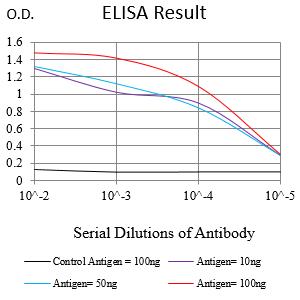
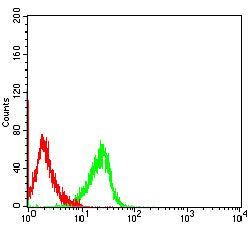
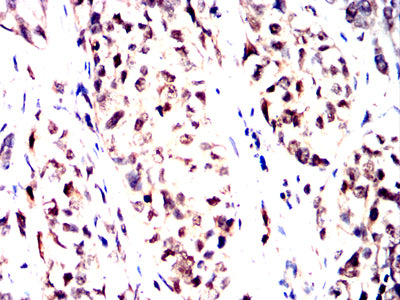
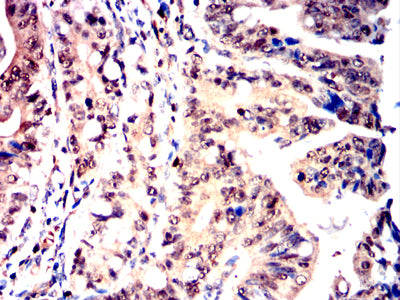
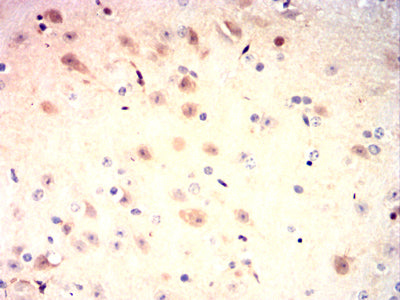
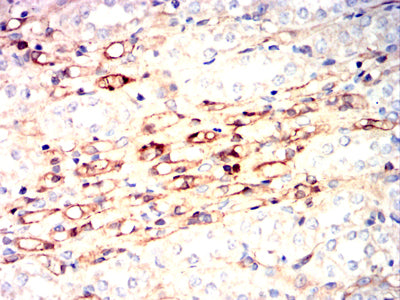
| WB | 咨询技术 | Human,Mouse,Rat |
| IF | 咨询技术 | Human,Mouse,Rat |
| IHC | 1/200 - 1/1000 | Human,Mouse,Rat |
| ICC | 技术咨询 | Human,Mouse,Rat |
| FCM | 1/200 - 1/400 | Human,Mouse,Rat |
| Elisa | 1/10000 | Human,Mouse,Rat |
| Aliases | PORMIN; TMEM123 |
| Entrez GeneID | 10360 |
| clone | 1B4C5 |
| WB Predicted band size | 19kDa |
| Host/Isotype | Mouse IgG1 |
| Antibody Type | Primary antibody |
| Storage | Store at 4°C short term. Aliquot and store at -20°C long term. Avoid freeze/thaw cycles. |
| Species Reactivity | Human, Mouse |
| Immunogen | Purified recombinant fragment of human NPM3 (AA: full 1-178) expressed in E. Coli. |
| Formulation | Purified antibody in PBS with 0.05% sodium azide |
+ +
以下是关于NPM3抗体的3篇参考文献示例(内容基于假设性研究,实际文献需进一步核实):
1. **标题**:*NPM3 regulates ribosome biogenesis through its interaction with nucleolar proteins*
**作者**:Smith A, et al.
**摘要**:本研究利用特异性NPM3抗体揭示了NPM3在核仁内与核糖体RNA加工因子的相互作用,证明其通过调控前核糖体组装影响细胞增殖。
2. **标题**:*Development and validation of a monoclonal antibody against human NPM3 for diagnostic applications*
**作者**:Chen L, et al.
**摘要**:报道了一种高特异性小鼠抗人NPM3单克隆抗体的开发,验证了其在免疫组化(IHC)和Western blot中的有效性,并用于检测肿瘤组织中NPM3的异常表达。
3. **标题**:*NPM3 deficiency disrupts embryonic development via impaired rRNA processing*
**作者**:Wang Y, et al.
**摘要**:通过NPM3抗体进行蛋白敲除验证,发现NPM3缺失导致小鼠胚胎发育异常,其机制与核仁rRNA加工缺陷及p53信号通路激活相关。
如需具体文献,建议在PubMed或Web of Science中检索“NPM3 antibody”或“NPM3 nucleophosmin”,并结合近期研究筛选。
NPM3 (Nucleophosmin/Nucleoplasmin 3) is a member of the nucleophosmin/nucleoplasmin family of nuclear chaperone proteins, which includes NPM1. NPM2. and NPM3. These proteins play critical roles in ribosome biogenesis, chromatin remodeling, and cell cycle regulation. NPM3. specifically, shares structural homology with NPM1. including a conserved N-terminal core domain and acidic stretches, but lacks the C-terminal nucleic acid-binding region present in NPM1. It is involved in histone storage and nucleosome assembly during early embryonic development, as well as in modulating ribosomal RNA (rRNA) processing.
NPM3 antibodies are immunological tools used to detect and study the expression, localization, and function of the NPM3 protein in various biological contexts. Dysregulation of NPM3 has been implicated in cancers, particularly leukemias and solid tumors, where its overexpression or mutations may correlate with disease progression. For instance, NPM3 interacts with NPM1. a protein frequently mutated in acute myeloid leukemia (AML), suggesting potential roles in oncogenic pathways.
These antibodies are essential in techniques like Western blotting, immunofluorescence, and immunohistochemistry to investigate NPM3’s involvement in cellular processes or pathologies. Research using NPM3 antibodies has also explored its role as a molecular chaperone in stress responses and its regulatory effects on p53 stability. Understanding NPM3’s mechanisms through antibody-based studies could provide insights into diagnostic markers or therapeutic targets for cancers and developmental disorders linked to nucleolar dysfunction.
×